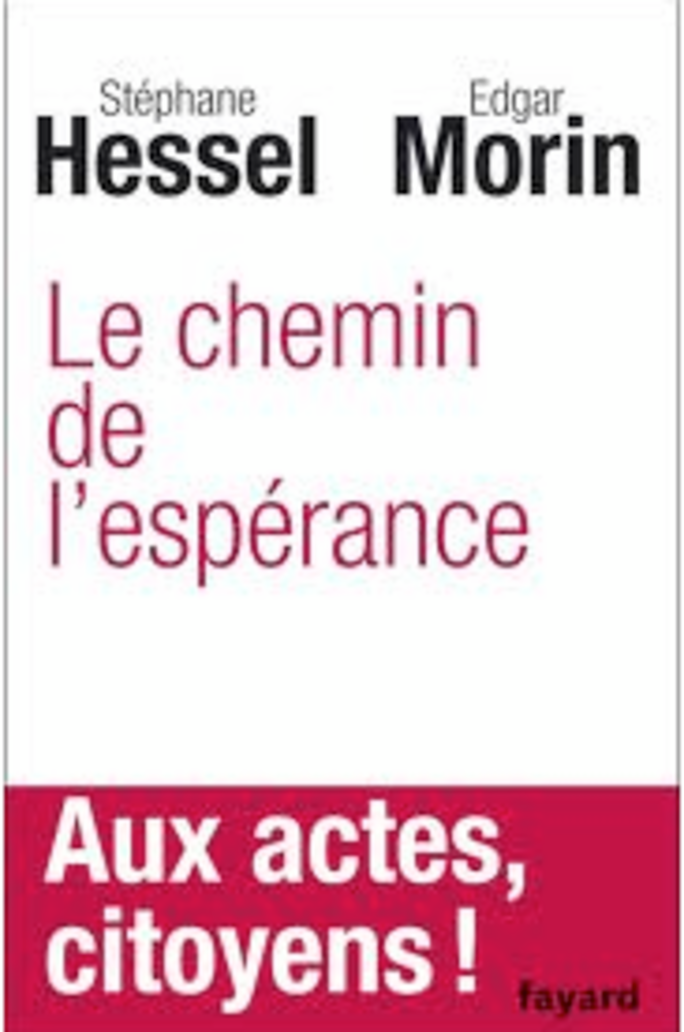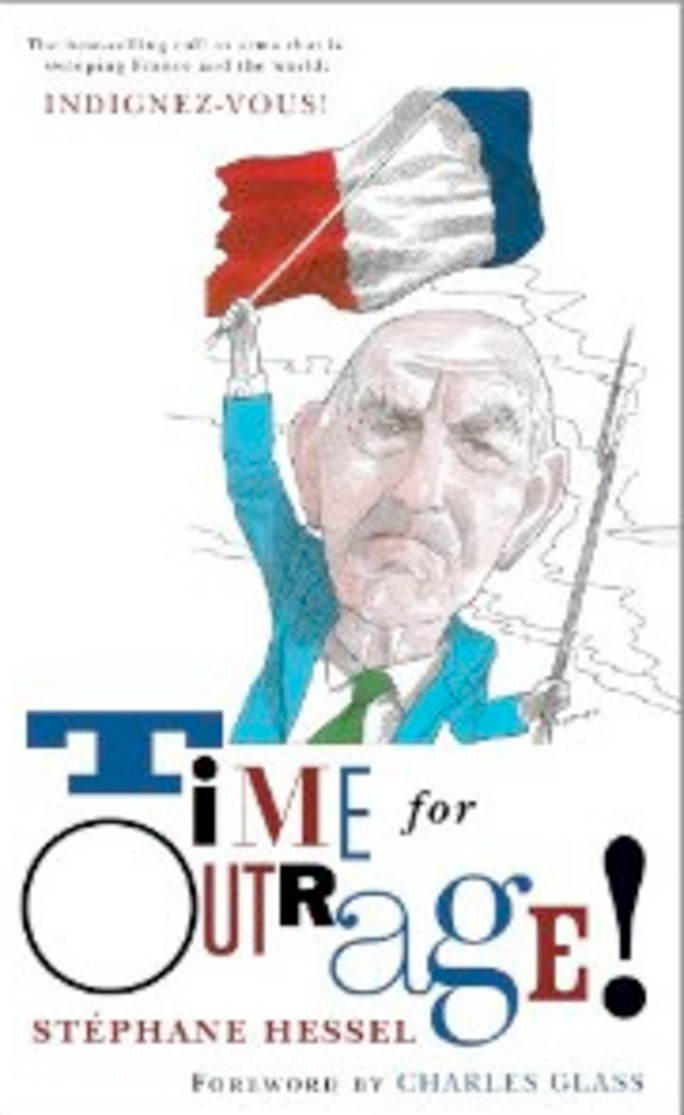Edgar Morin, 90, and Stéphane Hessel, 94, make a formidable pair. Hessel, a German naturalized French, former Resistance fighter, survivor of Nazi concentration camps who helped draft the UN's Universal Declaration of Human Rights, became a worldwide celebrity this year with his essay ‘Time for outrage', inspiring countless protests around the globe against the wayward drift of capitalism. Morin, born to immigrant parents, also a Resistance veteran, is unanimously acclaimed as one of Europe's greatest 20th-century thinkers. The two continue their life-long resistance against injustice with a joint appeal, launched here on Mediapart, aimed at candidates in the upcoming French presidential elections. They outline a "path of hope" for a new society that shuns "the futile, the disposable, and the wasteful", calling for an end to economic policies which are "driving us to disaster", and for a return to values of social responsibility. By Edwy Plenel and Hugo Vitrani.
-------------------------
Stéphane Hessel was born in Berlin in 1917 and arrived in France at the age of seven. He became a naturalised French citizen and after the outbreak of WWII joined the Resistance, when he was caught by the Gestapo and sent to the Buchenwald concentration camp, then escaping during his transfer to Bergen-Belsen. After the war, he helped draft the United Nations' Universal Declaration of Human Rights and became an honorary ‘Ambassador of France,' appointed to special government missions.
Those are just some of the giant milestones in the life of Hessel, now 94, who made resistance to injustice his lifelong mission. Well-known in France, he hit news headlines around the world (see examples here and here) this year after the extraordinary success of his 2010 book ‘Indignez-vous !' [1], a public call for indignation and action against the injustices of society and systems and which has now sold more than two million copies in France, and which is translated into 33 languages (English title: Time for Outrage).
Hessel is credited with at least partly inspiring recent protest movements, notably in Spain (‘indignados'), the US and UK (Occupy), which have seen young generations across the world protest at the excesses and injustices of modern capitalism.
Edgar Morin, 90, is widely recognised as one of France and Europe's leading 20th-century thinkers, the author of some 60 works centred largely on politics, philosophy and sociology. He was born in Paris to a family of Sephardic origin who had moved to France from the Greek city of Thessaloniki. After early activities in ant-fascist movements, he joined the French Resistance following the occupation of France (when he acquired the pseudonym of Morin, now his adopted name) and became a member of the French Communist Party.
After the war, the latter part of which he served in the army of liberated France, he led an active role in the Communist Party until he was expelled for his public criticisms of its policies. Soon afterwards he began an academic career, holding various posts in France and abroad, while producing a prolific catalogue of books and articles. He is today an emeritus director of research with the French National Scientific Research Center, the CNRS, and holds an itinerant chair for Complex Thought at UNESCO. His multi-disciplinary approach to his works is reflected in the honorary doctorates he has been awarded from some 14 universities across Europe and South America, including for political science, psychology and sociology.
Hessel and Morin, companions in resistance, have now chosen Mediapart to launch their joint appeal towards candidates running in the 2012 French presidential elections . Entitled ‘So that France rediscovers the path of hope', it is a summary, in the form of 12 commandments, of what they set out in their recent co-authored book, Le Chemin de l'espérance [2] (‘The path of hope') .
(See English translation, beginning page 2)
Their appeal, particularly aimed at candidates of the Left, is made in the name of all the expectations raised by recent protest movements both in the Arab world and the West. It is a call to transform such expectations into a political manifesto that has the power to offer future change.
-------------------------
1: Indignez-vous ! is published in France by Indigène Éditions.
2: Published in France by Fayard, priced 5 euros.
Doing away with resignation and fatalism

In their book, ‘The path of hope', the very first lines announce an ambitious project: "Dear fellow citizens, our aim is to denounce the perverse course of blind political policies that are driving us towards disaster", they write. "It is to set out a political path for public well-being. It is to announce a new hope."
The pair, who themselves have lived through and survived some of the worst disasters of the 20th century, attempt to lift the weight of resignation and fatalism that grips France, at a time when globalization is synonymous with ‘crisis' for populations, and ‘impotence' for politicians. Their arguments are punctuated by calls for "other ideas", "other political policies", and a "regeneration of our society".
They insist their propositions for a renewal of political thought in France are neither exhaustive nor definitive, but are "formulated to be criticized, complemented, and reshuffled." Addressing the parties of the left in particular, they argue for "four sources" upon which they believe the French left should find inspiration for regeneration. "The source of freedom, which concentrates on the liberty of individuals: the socialist source, which is concentrated upon bettering society: the communist source, which concentrates itself upon community fraternity [and] the ecological source, which gives back to us our links and interdependence with nature."
"We do not propose a pact with the existing parties," they conclude. "We wish to contribute to the formation of a strong citizens' movement, to an insurrection of consciences that could lead to political policies that meet the level of the demands."
The following is their appeal, based on what they set out in their book, for a political lead towards such changes. Translated here from the original in French, minor modifications have been made for reasons of clarity.
‘So that France rediscovers the path of hope'; an appeal by Stéphane Hessel and Edgar Morin
1. We take note that the force which the young posess to achieve freedom, using modern new information technology, proved itself capable of tumbling despotic regimes in the Arab world, to wake up every age group and social class, and that this force has become that of the indignés protests, from the ‘indignado' movement in Spain to the ‘Occupy' camps in the US, defying the powers that be, notably that unbridled one of financial capitalism. If this force is capable of provoking rupture and awakening, it lacks the political ideas capable of uniting the strength of peoples to embark on a path of hope. It is a formulation of such ideas that we propose here to the candidates in the French presidential elections.
2. As France is not alone in the world, and because its destiny partly depends on the world, it should propose a reform of the United Nations which renders the organisation capable of dealing with current conflicts, including the painful Israeli-Palestinian conflict, and which would also set up three worldwide bodies that are given powers:
- to overcome the international crisis by truly regulating the world economy;
- to protect the biosphere, the accelerating degradation of which diminishes the living standards of humanity;
- to go about the elimination of arms of mass destruction.
3. Because France is a member of the European Union, it should work within it for the development of a common policy for the protection of its populations, for development and cooperation, the integration of immigration fluxes, and for just proposals for peace in the world.
4. French political policies should be oriented towards providing a well-being that is comprehensive and reaches further than material well-being, thereby restoring a quality of life that is forever diminishing.
5. Such policies could, at the same time, deal with the economic crisis and reduce unemployment by developing appropriate measures to:
- halt financial speculation,
- combine the globalization of cooperation and exchange with a de-globalization of the protection of vital local, regional or national interests,
- produce strong growth in the green economy, of a social and socially united economy, and that of fair trade, while overseeing a parallel reduction of the economy based on the futile, the disposable, the wasteful, a process joined by the development of detoxified consumption habits,
- favour farm- and organic-based agriculture and rearing, and a reduction in large, industrial practices.
6. Such policies would work for a reduction in inequalities, notably through fiscal reforms and the creation of an observatory of inequalities, which would make yearly recommendations.
7. These policies would create a regeneration of solidarity, notably by setting up, in every town, centres of fraternity and also by establishing a civic service of social solidarity.
8. They would incite a reduction in bureaucracy among public administrations and private companies by removing the narrow and fixed partitions imposed on the workforce and giving the possibility of initiative back to employees.
(Continued on page 3)
'A new period in the history of humanity'

9. These policies would encourage participative democracy by establishing urban and municipal councils made up of elected members, administrators, competent professionals and citizens.
10. Such policies would include a reform of education at all levels, in such a way that lessons on fundamental and global problems, the teaching of which requires multi-disciplinary skills, are taught from the earliest classes. This would meet what was prescribed by Jean-Jacques Rousseau: ‘Teach how to live'.
11. All of these reforms should be complimentary and converge towards a grand plan that would open up a path of hope for France.
12. A French president should firstly take act of the major challenges which face the world, (energy, water, famine, climate, pollution and more), a world in which France has its place and its responsibility. A president should have the courage to drastically reduce the enormous spending, either useless or noxious, on such things as weapons or nuclear power, and to reduce the huge wastage that holds back a healthy and productive economy. He must know that immense human resources remain unengaged, and that there is in the people of France, if they are given a place of initiative and hope, very great creative potential. The new policies should be put at the service of citizens, and they will in turn place themselves at their service.
We are at the threshold of a new period in the history of humanity and already everywhere, notably among the young generations, initiatives are born that carry with them a future of hope.
In their book, Hessel and Morin note that the French "carry in our national heritage universal principles which are so well expressed in the eleventh and twelfth verses, still little known today, of [French national anthem] La Marseillaise." The verses in question refer to a France that is inextricably bound to the fate of the world and its peoples. The indefatigable pair agreed to sing them for Mediapart readers (see video below), as an invitation not only to become outraged, but also to take part in formulating a democratic, social and ecological hope for the future. It was plain to see that they greatly enjoyed the exercise:
-------------------------
English version: Graham Tearse


